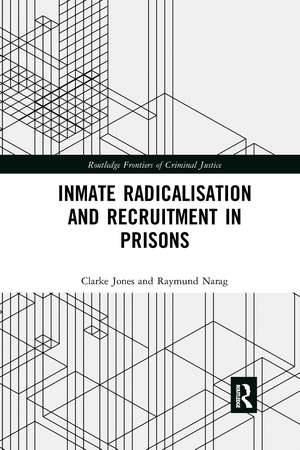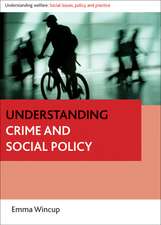Inmate Radicalisation and Recruitment in Prisons: Routledge Frontiers of Criminal Justice
Autor Clarke Jones, Raymund Naragen Limba Engleză Paperback – 30 sep 2020
Inmate Radicalisation and Recruitment in Prisons challenges existing perceptions about prison radicalisation. Whilst not downplaying the seriousness of the prison radicalisation threat, it seeks a more balanced interpretation of current discussion. Drawing on original research in the Philippines and case studies from Australia, the US, Canada, Indonesia, the UK, France, the Netherlands, and Belgium, the authors posit an alternative view that suggests that the imprisonment of a terrorist may mark the beginning of physical disengagement and psychological de-radicalisation.
Offering evidence-based insights to help determine how best to house terrorist offenders, this volume will appeal to students and researchers interested in fields such as Criminology and Criminal Justice, Terrorism, Prisons, and Organised Crime.
| Toate formatele și edițiile | Preț | Express |
|---|---|---|
| Paperback (1) | 258.50 lei 6-8 săpt. | |
| Taylor & Francis – 30 sep 2020 | 258.50 lei 6-8 săpt. | |
| Hardback (1) | 999.46 lei 6-8 săpt. | |
| Taylor & Francis – 13 dec 2018 | 999.46 lei 6-8 săpt. |
Din seria Routledge Frontiers of Criminal Justice
-
 Preț: 303.16 lei
Preț: 303.16 lei -
 Preț: 289.85 lei
Preț: 289.85 lei -
 Preț: 311.06 lei
Preț: 311.06 lei -
 Preț: 301.54 lei
Preț: 301.54 lei -
 Preț: 349.87 lei
Preț: 349.87 lei -
 Preț: 309.55 lei
Preț: 309.55 lei -
 Preț: 310.12 lei
Preț: 310.12 lei -
 Preț: 313.08 lei
Preț: 313.08 lei -
 Preț: 152.71 lei
Preț: 152.71 lei -
 Preț: 279.99 lei
Preț: 279.99 lei -
 Preț: 311.85 lei
Preț: 311.85 lei -
 Preț: 287.89 lei
Preț: 287.89 lei -
 Preț: 283.04 lei
Preț: 283.04 lei - 8%
 Preț: 388.77 lei
Preț: 388.77 lei -
 Preț: 312.54 lei
Preț: 312.54 lei -
 Preț: 323.91 lei
Preț: 323.91 lei -
 Preț: 151.96 lei
Preț: 151.96 lei -
 Preț: 326.49 lei
Preț: 326.49 lei -
 Preț: 325.45 lei
Preț: 325.45 lei - 8%
 Preț: 389.00 lei
Preț: 389.00 lei - 9%
 Preț: 865.41 lei
Preț: 865.41 lei -
 Preț: 251.17 lei
Preț: 251.17 lei -
 Preț: 341.55 lei
Preț: 341.55 lei - 18%
 Preț: 1057.89 lei
Preț: 1057.89 lei - 18%
 Preț: 1053.64 lei
Preț: 1053.64 lei - 18%
 Preț: 1172.23 lei
Preț: 1172.23 lei -
 Preț: 390.54 lei
Preț: 390.54 lei -
 Preț: 491.26 lei
Preț: 491.26 lei - 18%
 Preț: 1106.81 lei
Preț: 1106.81 lei - 18%
 Preț: 1170.74 lei
Preț: 1170.74 lei - 18%
 Preț: 1057.75 lei
Preț: 1057.75 lei -
 Preț: 276.84 lei
Preț: 276.84 lei -
 Preț: 401.54 lei
Preț: 401.54 lei - 13%
 Preț: 310.05 lei
Preț: 310.05 lei - 28%
 Preț: 819.25 lei
Preț: 819.25 lei -
 Preț: 463.62 lei
Preț: 463.62 lei - 18%
 Preț: 1000.27 lei
Preț: 1000.27 lei - 18%
 Preț: 1006.92 lei
Preț: 1006.92 lei - 18%
 Preț: 1170.74 lei
Preț: 1170.74 lei - 18%
 Preț: 997.90 lei
Preț: 997.90 lei - 18%
 Preț: 1109.99 lei
Preț: 1109.99 lei - 18%
 Preț: 1175.72 lei
Preț: 1175.72 lei - 18%
 Preț: 1109.99 lei
Preț: 1109.99 lei -
 Preț: 354.21 lei
Preț: 354.21 lei - 18%
 Preț: 1107.61 lei
Preț: 1107.61 lei
Preț: 258.50 lei
Preț vechi: 318.24 lei
-19% Nou
Puncte Express: 388
Preț estimativ în valută:
49.46€ • 51.75$ • 41.09£
49.46€ • 51.75$ • 41.09£
Carte tipărită la comandă
Livrare economică 02-16 aprilie
Preluare comenzi: 021 569.72.76
Specificații
ISBN-13: 9780367663438
ISBN-10: 0367663430
Pagini: 206
Dimensiuni: 156 x 234 x 20 mm
Greutate: 0.38 kg
Ediția:1
Editura: Taylor & Francis
Colecția Routledge
Seria Routledge Frontiers of Criminal Justice
Locul publicării:Oxford, United Kingdom
ISBN-10: 0367663430
Pagini: 206
Dimensiuni: 156 x 234 x 20 mm
Greutate: 0.38 kg
Ediția:1
Editura: Taylor & Francis
Colecția Routledge
Seria Routledge Frontiers of Criminal Justice
Locul publicării:Oxford, United Kingdom
Public țintă
Postgraduate and UndergraduateCuprins
Chapter 1 – Introduction
Bibliography
Chapter 2 – The Inmate Social System and Coping with the "Pains of Imprisonment"
Early Western Perspectives on Inmate Social Systems
Inmate Code and Solidarity
Inmate Leadership Structure
Deprivation Perspective
Importation Perspective
Managerial Perspective
Bibliography
Chapter 3 – Religion and Rehabilitation in Prisons
Prison Conversions
Role of Religion
De-Radicalisation
Bibliography
Chapter 4 – The Management of VEOs in Asia-Pacific
Australia
Overcrowding
VEO Assessment, Classification and Placement
Corrections NSW
Corrections Victoria
The United States
Canada
Indonesia
Bibliography
Chapter 5 – The Management of VEOs in Europe
The United Kingdom
France
The Netherlands
Belgium
Summary of Management Strategies
Bibliography
Chapter 6 – The Complexity of the Philippines Correctional System
Deprivation Perspectives
Coping Mechanisms
Inmate Prisonisation
Inmate code
Shared Governance and Prison Gangs
Summary of Conditions
Bibliography
Chapter 7 – Understanding VEOs in the Philippines Correctional System
Origins of VEOs in the Philippines
Part A: VEOs on Remand in Philippines Jails
SICA 1
SICA 2
MMDJ Annex 2 and 3
Inmate Risk Assessment, Classification, Case Management, and Programming
Part B: Convicted VEOs in Philippines Prisons: NBP’s Maximum-Security Compound
Mosque and Al-Rahman Islamic School
De-Radicalisation / Intervention Programs
Implications for VEO Management: A Way Forward in Managing VEOs
A Way Forward
Bibliography
Chapter 8 – Conclusion
Bibliography
Bibliography
Chapter 2 – The Inmate Social System and Coping with the "Pains of Imprisonment"
Early Western Perspectives on Inmate Social Systems
Inmate Code and Solidarity
Inmate Leadership Structure
Deprivation Perspective
Importation Perspective
Managerial Perspective
Bibliography
Chapter 3 – Religion and Rehabilitation in Prisons
Prison Conversions
Role of Religion
De-Radicalisation
Bibliography
Chapter 4 – The Management of VEOs in Asia-Pacific
Australia
Overcrowding
VEO Assessment, Classification and Placement
Corrections NSW
Corrections Victoria
The United States
Canada
Indonesia
Bibliography
Chapter 5 – The Management of VEOs in Europe
The United Kingdom
France
The Netherlands
Belgium
Summary of Management Strategies
Bibliography
Chapter 6 – The Complexity of the Philippines Correctional System
Deprivation Perspectives
Coping Mechanisms
Inmate Prisonisation
Inmate code
Shared Governance and Prison Gangs
Summary of Conditions
Bibliography
Chapter 7 – Understanding VEOs in the Philippines Correctional System
Origins of VEOs in the Philippines
Part A: VEOs on Remand in Philippines Jails
SICA 1
SICA 2
MMDJ Annex 2 and 3
Inmate Risk Assessment, Classification, Case Management, and Programming
Part B: Convicted VEOs in Philippines Prisons: NBP’s Maximum-Security Compound
Mosque and Al-Rahman Islamic School
De-Radicalisation / Intervention Programs
Implications for VEO Management: A Way Forward in Managing VEOs
A Way Forward
Bibliography
Chapter 8 – Conclusion
Bibliography
Notă biografică
Clarke Jones is a criminologist based at the Research School of Psychology at the Australian National University, Australia
Raymund E. Narag is an assistant professor in the Department of Criminal Justice at Southern Illinois University Carbondale, USA
Raymund E. Narag is an assistant professor in the Department of Criminal Justice at Southern Illinois University Carbondale, USA
Recenzii
"How best to manage terrorists in prison, and to ensure that ordinary prisoners are not radicalized during their time in custody, are key issues confronting authorities around the world. Some favour isolation or segregation of convicted terrorists, while others advocate their integration in the general prison community. However, prisons vary widely within and between countries in terms of resources, administrative practices, inmate culture, and the role of religion in prisoner management. Consequently, there can be no "one size fits all" solution to the challenge of prisoner radicalization. The authors of this excellent book warn us against the risks of counterproductive initiatives, and sound a loud and clear call for evidence-based policy in this crucial policy space."
Peter Grabosky, Emeritus Professor, School of Regulation and Global Governance, Australian National University
"Using a wealth of ethnographic data, the book provides a fascinating look at punitive correctional policies aimed at violent extremists while also providing promising suggestions for reform. A great addition to the existing literature on terrorism that focuses on prison environments and inmate culture."
Bryan F. Bubolz, Assistant Professor, Department of Criminology and Criminal Justice, Southern Illinois University Carbondale, USA
"Inmate Radicalisation and Recruitment in Prisons is a comprehensive consideration of the policy dilemmas of terrorist offenders in prison. It elegantly surveys what we know from prisons in the west and Asia. The book grapples with the complexities of the policy choices. All options risk both radicalization of other prisoners by violent extremists and deradicalization of violent extremists by prison gangs, religious leaders and other social formations inside prisons. Clarke Jones and Raymund Narag have wide experience, especially in the Philippines and Australia, with violent extremists inside. They have dug d
Peter Grabosky, Emeritus Professor, School of Regulation and Global Governance, Australian National University
"Using a wealth of ethnographic data, the book provides a fascinating look at punitive correctional policies aimed at violent extremists while also providing promising suggestions for reform. A great addition to the existing literature on terrorism that focuses on prison environments and inmate culture."
Bryan F. Bubolz, Assistant Professor, Department of Criminology and Criminal Justice, Southern Illinois University Carbondale, USA
"Inmate Radicalisation and Recruitment in Prisons is a comprehensive consideration of the policy dilemmas of terrorist offenders in prison. It elegantly surveys what we know from prisons in the west and Asia. The book grapples with the complexities of the policy choices. All options risk both radicalization of other prisoners by violent extremists and deradicalization of violent extremists by prison gangs, religious leaders and other social formations inside prisons. Clarke Jones and Raymund Narag have wide experience, especially in the Philippines and Australia, with violent extremists inside. They have dug d
Descriere
Inmate Radicalisation and Recruitment in Prisons challenges existing perceptions about prison radicalisation. Whilst not downplaying the seriousness of the prison radicalisation threat, it seeks a more balanced interpretation of current discussion.













